Liturgical music
by Fr. Daniel Pattee
Joanna Bratten’s article in last issue of the Concourse calling for reform in our liturgical music is concerned mainly with the category of the"aesthetic” in our Eucharistic liturgies at Franciscan University.
I have spent this semester on the Austrian campus and have sat across the table from different students who, on three separate occasions, attended Sunday Mass in Vienna as sung by the Vienna Boy’s Choir. I listened and heard at least three common elements in their differing accounts of that experience: there was doubt about whether those in attendance came to hear the Vienna Boy’s Choir or to receive Jesus Christ in Word and Sacrament (seats were reserved and paid for in advance); very few persons came forward to receive Holy Communion; and, on the whole, there was very little participation on the part of the congregation in either responding to the priest or singing the parts of the Mass. This is perhaps one of the most beautiful Eucharistic liturgies celebrated in all of Vienna on any given Sunday, and yet such beauty has not lead many to receive Christ in the Eucharist.
My intention is not to argue against concern for beauty in the Mass, but rather to say this: the most beautiful Mass in the world, without faith, is simply a concert ex opere operatis. The problem, at least as I see it, is not “a world increasingly dry and bereft of beauty,” but rather hearts “dry and bereft” of the faith which enables us to rejoice with “how beautiful upon the mountains are the feet of him who brings good news.” (Is.52:7)
“Beauty, ever ancient, ever new” is not the end product of our becoming cultured; it is a Person we meet through faith, a Person who addresses us and makes claims upon us in every Eucharist we celebrate. “Beauty ever ancient, ever new” is Jesus Christ who comes to us in Word and Sacrament in the Mass. In this light, I would like to suggest the following: any conversation on the topic of liturgical music at Franciscan University of Steubenville that would fail to take into account the thoroughly evangelistic nature of the Eucharist, and the pressing need for new evangelization within contemporary culture, is simply moving chairs around on the deck of the Titanic.
Fr. Daniel Patee, TOR
Fr. Dan returned last week from the Austrian campus, where he had been teaching theology.


